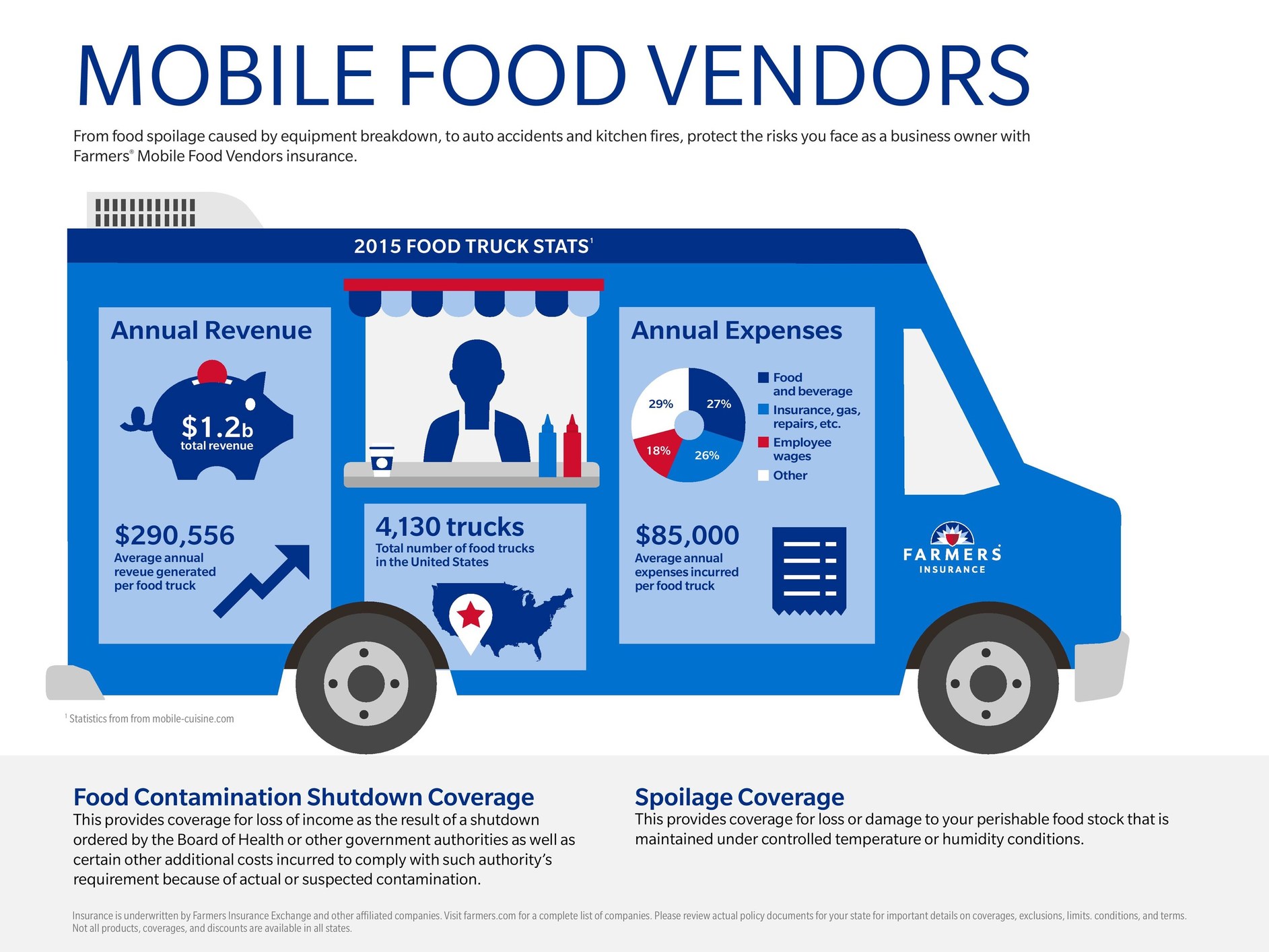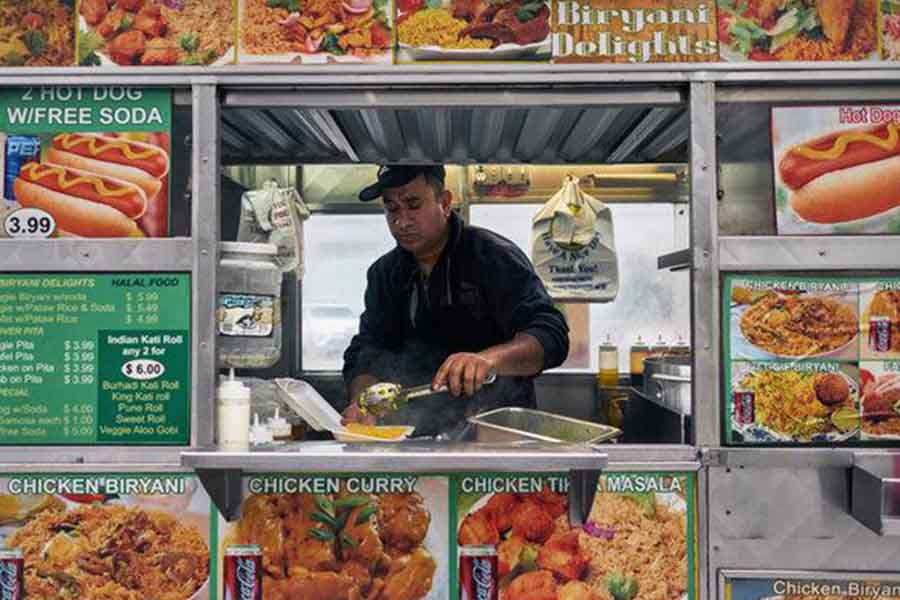In the culinary world, where sizzling pans meet hungry crowds, food vendor insurance emerges as the unsung hero, safeguarding your business from unexpected mishaps. It’s not just about protecting your delicious creations; it’s about ensuring your financial well-being and legal compliance.
Dive into this comprehensive guide to food vendor insurance and discover why it’s the secret ingredient to your business’s success.
From understanding the different types of coverage to navigating the cost and application process, we’ll unveil everything you need to know about this essential insurance. So, buckle up, grab a pen, and get ready to equip your food vendor business with the protection it deserves.
Types of Food Vendor Insurance

Food vendor insurance is essential for any business that sells food or beverages to the public. It can protect your business from financial losses in the event of a covered incident, such as a foodborne illness outbreak, property damage, or a lawsuit.
There are several different types of food vendor insurance available, each with its own coverage options. The most common types of food vendor insurance include:
General Liability Insurance
General liability insurance is a type of business insurance that provides coverage for bodily injury and property damage caused by your business operations. This type of insurance is essential for any food vendor, as it can protect your business from lawsuits if someone is injured or their property is damaged as a result of your business operations.
Product Liability Insurance
Product liability insurance is a type of insurance that provides coverage for injuries or damages caused by your products. This type of insurance is important for food vendors, as it can protect your business from lawsuits if someone is injured or their property is damaged as a result of consuming your products.
Commercial Property Insurance
Commercial property insurance is a type of insurance that provides coverage for your business property, such as your building, equipment, and inventory. This type of insurance is important for food vendors, as it can protect your business from financial losses in the event of a covered incident, such as a fire or theft.
Business Interruption Insurance
Business interruption insurance is a type of insurance that provides coverage for lost income and expenses if your business is forced to close temporarily due to a covered incident, such as a natural disaster or a fire. This type of insurance is important for food vendors, as it can help you to keep your business afloat during a difficult time.
Benefits of Food Vendor Insurance
Food vendor insurance is a crucial investment for any business that prepares and sells food to the public. It provides a safety net against financial losses and legal liabilities that can arise from incidents such as foodborne illnesses, property damage, or customer injuries.
With food vendor insurance, businesses can operate with peace of mind, knowing that they are protected from unexpected events that could jeopardize their financial stability or reputation.
Protection from Financial Losses
- Covers medical expenses:If a customer becomes ill after consuming food from your establishment, food vendor insurance can help cover their medical expenses, including hospitalization, doctor’s visits, and medications.
- Compensates for lost income:In the event of a foodborne illness outbreak or other incident that forces your business to close temporarily, food vendor insurance can provide compensation for lost income.
- Protects against property damage:If your food truck or equipment is damaged or destroyed in a fire, theft, or other covered event, food vendor insurance can help cover the cost of repairs or replacements.
Compliance with Legal Requirements
Many states and municipalities require food vendors to carry liability insurance. Food vendor insurance can help you meet these legal requirements and avoid fines or penalties.
Additionally, food vendor insurance can provide coverage for legal defense costs if you are sued by a customer who alleges that they became ill after consuming food from your establishment.
Factors to Consider When Choosing Food Vendor Insurance
Choosing the right food vendor insurance policy is essential to protect your business from financial risks. Here are some key factors to consider when making your decision:
Type of Business, Food vendor insurance
The type of food vendor business you operate will impact the coverage you need. For example, a mobile food vendor will need different coverage than a brick-and-mortar restaurant.
Food vendor insurance is a must-have for any business that sells food to the public. It protects you from financial losses in the event of a foodborne illness outbreak or other covered incident. If you’re looking for a healthy and nutritious dog food, I highly recommend gentle giant dog food . It’s made with real meat and vegetables, and it’s free of artificial flavors and preservatives.
Plus, it’s affordable and easy to find. Getting food vendor insurance is a smart way to protect your business and your customers.
Location of Business
The location of your business can also affect your insurance needs. For example, if you operate in an area with a high crime rate, you may need more comprehensive coverage.
Coverage Needs
The specific coverage needs of your business will vary depending on your individual circumstances. Some of the most common types of coverage include:
- General liability insurance
- Property insurance
- Business interruption insurance
- Workers’ compensation insurance
Tips for Choosing the Right Policy
Here are some tips for choosing the right food vendor insurance policy:
- Compare quotes from multiple insurance companies.
- Read the policy carefully before you buy it.
- Make sure you understand the coverage limits and exclusions.
- Work with an insurance agent who can help you find the right policy for your needs.
By following these tips, you can choose the right food vendor insurance policy to protect your business from financial risks.
Cost of Food Vendor Insurance

The cost of food vendor insurance varies depending on several factors, including the type of food being served, the location of the business, the amount of coverage needed, and the insurance company. Here are some of the factors that can affect the cost of food vendor insurance:
- Type of food being served:The type of food being served can affect the cost of insurance. For example, food vendors who serve high-risk foods, such as raw meat or fish, will typically pay more for insurance than those who serve low-risk foods, such as pre-packaged snacks.
- Location of the business:The location of the business can also affect the cost of insurance. Food vendors who operate in high-crime areas or in areas with a high risk of natural disasters will typically pay more for insurance than those who operate in low-risk areas.
- Amount of coverage needed:The amount of coverage needed will also affect the cost of insurance. Food vendors who need high limits of coverage will typically pay more for insurance than those who need lower limits of coverage.
- Insurance company:The insurance company can also affect the cost of insurance. Some insurance companies charge higher rates than others for food vendor insurance.
The cost of food vendor insurance can range from a few hundred dollars per year to several thousand dollars per year. The average cost of food vendor insurance is around $1,000 per year.
There are a number of things that food vendors can do to reduce the cost of their insurance. These include:
- Shopping around for insurance:Getting quotes from multiple insurance companies can help food vendors find the best rate on insurance.
- Increasing their deductible:Increasing the deductible on their insurance policy can lower their premium. However, food vendors should make sure that they can afford to pay the deductible if they need to file a claim.
- Taking safety precautions:Taking steps to reduce the risk of accidents and injuries can help food vendors lower their insurance costs. This includes things like maintaining a clean and safe work environment, training employees on safety procedures, and having a written safety plan in place.
How to Get Food Vendor Insurance

Getting food vendor insurance is a relatively straightforward process. Here are the steps involved:
- Determine the type of coverage you need.The type of coverage you need will depend on the specific risks your business faces. Consider factors such as the size of your business, the types of food you serve, and the location of your business.
- Get quotes from multiple insurance companies.Once you know the type of coverage you need, you can start getting quotes from different insurance companies. Be sure to compare the coverage, cost, and deductibles of each policy before making a decision.
- Purchase a policy.Once you’ve found a policy that meets your needs, you can purchase it and start protecting your business.
Checklist of Documents Needed to Get Food Vendor Insurance
- Business license
- Certificate of insurance
- Proof of income
- Menu
- Equipment list
Different Ways to Get Food Vendor Insurance
There are several different ways to get food vendor insurance. You can:
- Purchase a policy directly from an insurance company.This is the most common way to get food vendor insurance. You can find insurance companies that specialize in food vendor insurance online or through your local insurance agent.
- Purchase a policy through a broker.A broker is an independent agent who can help you find the best food vendor insurance policy for your needs. Brokers typically have relationships with multiple insurance companies, which gives them access to a wider range of policies and rates.
- Purchase a policy through a trade association.Some trade associations offer food vendor insurance to their members. This can be a good option if you’re already a member of a trade association.
Last Recap
Food vendor insurance is not just a safety net; it’s an investment in the future of your culinary venture. By understanding the types of coverage available, the factors that influence cost, and the steps involved in obtaining it, you can make informed decisions that safeguard your business.
Remember, in the fast-paced world of food vending, unexpected events can strike at any moment. Don’t let a culinary mishap turn into a financial disaster. Protect your passion, protect your business, and secure your dreams with food vendor insurance.
